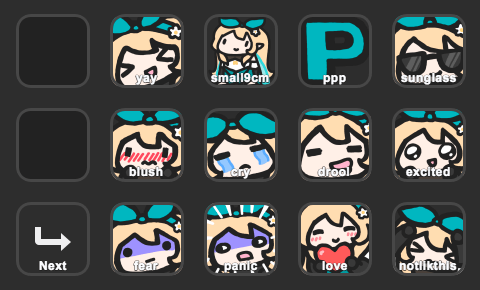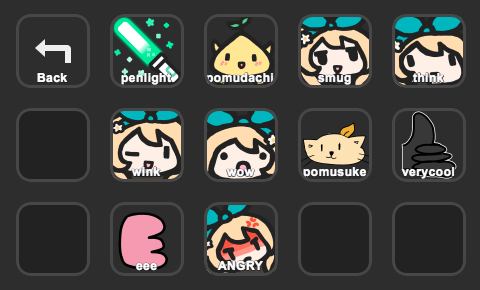CLI tool to generate Stream Deck profiles for YouTube membership emotes.
Visit the releases page to find the latest release for your platform.
The following command creates an executable at ./target/release/streamdeck-youtube-emotes
cargo build --releaseThe program extracts the list of emotes from the ytInitialData variable
defined in the HTML of a channel's membership page. E.g.,
https://www.youtube.com/channel/UCP4nMSTdwU1KqYWu3UH5DHQ/membership
Unfortunately the emote data is only available when you're logged in, so the download must be done through your browser. If you download the file in Chrome, make sure to select "Webpage, HTML Only" as the format when saving (to avoid any additional postprocessing of the HTML file).
Assuming you've saved the HTML to a file /tmp/pomu.html and have a standard
15-key Stream Deck, you can run the following:
streamdeck-youtube-emotes \
--name "Pomu Emotes" \
--prefix pomu \
--include-labels \
--model standard \
--prioritize yay small9cm \
--deprioritize verycool eee ANGRY \
--html-file /tmp/pomu.html \
--restartThis command will:
- Generate a Stream Deck profile named "Pomu Emotes"
- The prefix will be
pomu, so pressing the key for thesmall9cmemote will input:_pomuSmall9cm: - Each emote key will have a label with the name of the emote below it
- The
yayandsmall9cmemotes will be moved to the beginning of the list - The
verycool,eee, andANGRYemotes will be moved the end
- The prefix will be
- Save it to the default profiles directory on your platform
(E.g.,
"$HOME/Library/Application Support/com.elgato.StreamDeck/ProfilesV2/"on macOS) - Restart the Stream Deck application so that the changes are picked up
The UUID of the profile is based on the --name param, so if you re-run the
command with different options but with the same name, it will save to the same
profile.
Here is an example of a profile with two pages of emotes, generated with the command above, using Pomu Rainpuff's membership page as input.
The generated profile will have one column of reserved space on the left, which will be occupied by the next/previous buttons (in cases where the channel has more emotes than can fit on a single page).
Other empty spaces can be filled via the Stream Deck UI, so you can have custom
keys for switching profiles, etc. These empty spaces will not be overwritten
when generating the profile again (unless the --no-merge flag is set)
The full list of options can be found below:
USAGE:
streamdeck-youtube-emotes [FLAGS] [OPTIONS] --html-file <html-file> --model <model> --name <name>
FLAGS:
-h, --help
Prints help information
--include-labels
Whether to include the name of the emote on each key
--no-merge
Overwrite existing manifest files instead of merging them
--restart
Restart the Stream Deck application after creating the profile
-V, --version
Prints version information
OPTIONS:
--deprioritize <deprioritize>...
List of emotes that should appear last, after all others (case-insensitive)
--device-uuid <device-uuid>
Device UUID for the Stream Deck [default: ]
--html-file <html-file>
Path to an HTML file containing the memberships page for a channel. E.g., Download the following page in a
browser while logged in: https://www.youtube.com/channel/UCP4nMSTdwU1KqYWu3UH5DHQ/memberships
Use - to read from stdin.
--model <model>
The Stream Deck model to generate the profile for [possible values: standard, xl, mini]
--name <name>
Name of the Stream Deck profile. Note that if the `profile-uuid` argument is unspecified, this name will be
used to determine the name of the output profile directory
--out <out>
Output path to save the profile to. If unspecified, profiles will be saved to the default Stream Deck
profile location (depending on platform)
--prefix <prefix>
The emote prefix (also known as "family name"). For example, if the channel has an emote `:_pomuSmall9cm:`,
the emote prefix would be `pomu`. For some channels, there is no prefix, so this option can be omitted
[default: ]
--prioritize <prioritize>...
List of emotes that should appear first, before all others (case-insensitive)
--profile-uuid <profile-uuid>
Override the UUID for the profile

